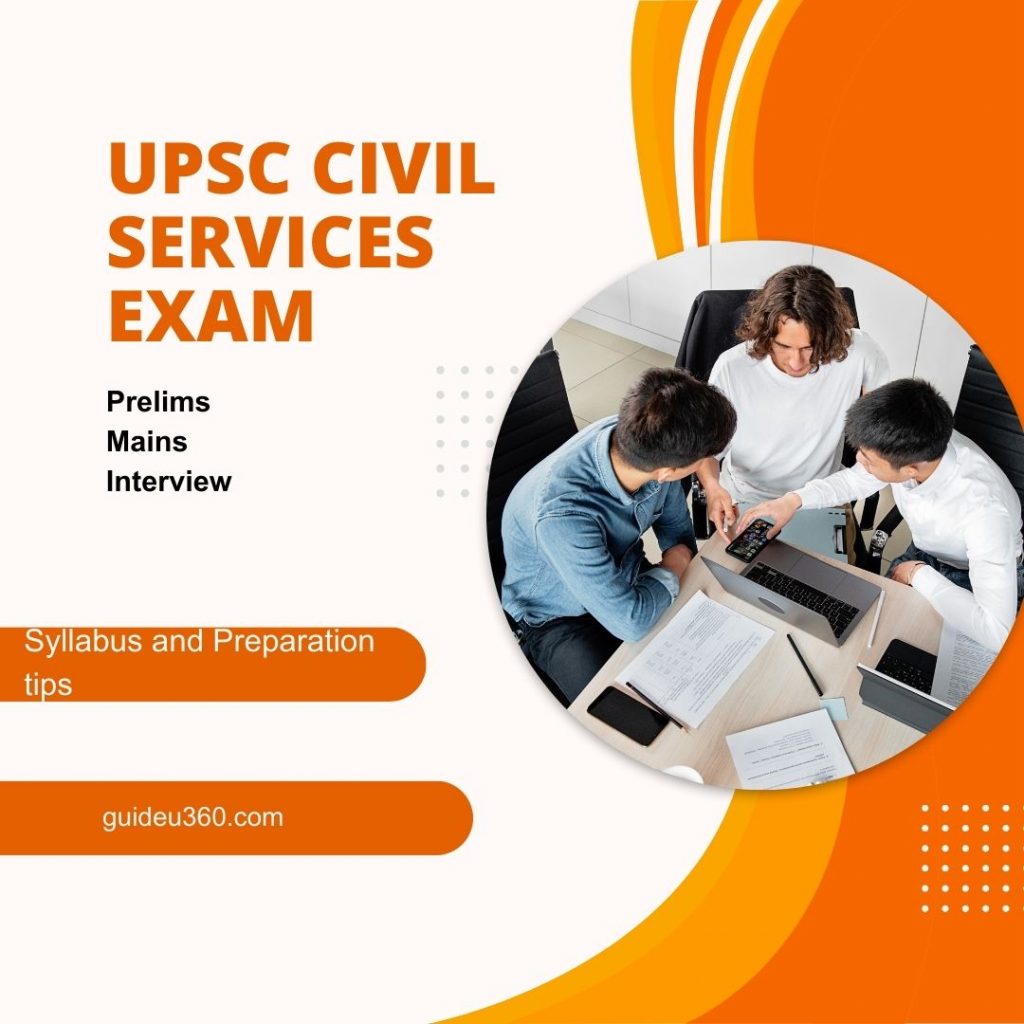The Union Public Service Commission (UPSC) Civil Services Examination (CSE) is one of the most prestigious exams in India. It is conducted in three stages: Preliminary, Mains, and the Personality Test (Interview). This comprehensive guide covers the syllabus for each stage and provides essential tips to help you prepare effectively.
UPSC Exam Syllabus and Preparation Tips

UPSC Preliminary Exam Syllabus
The Preliminary exam consists of two objective-type papers:
- General Studies Paper I:
- Current events of national and international importance.
- History of India and Indian National Movement.
- Indian and World Geography – Physical, Social, Economic Geography of India and the World.
- Indian Polity and Governance – Constitution, Political System, Panchayati Raj, Public Policy, Rights Issues, etc.
- Economic and Social Development – Sustainable Development, Poverty, Inclusion, Demographics, Social Sector Initiatives, etc.
- General issues on Environmental Ecology, Biodiversity, and Climate Change – that do not require subject specialization.
- General Science.
- General Studies Paper II (CSAT):
- Comprehension.
- Interpersonal skills including communication skills.
- Logical reasoning and analytical ability.
- Decision-making and problem-solving.
- General mental ability.
- Basic numeracy (numbers and their relations, orders of magnitude, etc.) (Class X level).
- Data interpretation (charts, graphs, tables, data sufficiency, etc. – Class X level).
UPSC Mains Exam Syllabus
The Mains exam consists of nine papers, of which seven are counted for final ranking. The remaining two papers are qualifying in nature.
- Paper A – Indian Language (Qualifying):
- Comprehension of given passages.
- Precis Writing.
- Usage and Vocabulary.
- Short Essays.
- Translation from English to the Indian language and vice-versa.
- Paper B – English (Qualifying):
- Comprehension of given passages.
- Precis Writing.
- Usage and Vocabulary.
- Short Essays.
- Paper I – Essay:
- Candidates may be required to write essays on multiple topics. They are expected to keep closely to the subject of the essay, arrange their ideas orderly, and write concisely. Credit is given for effective and exact expression.
- Paper II – General Studies I:
- Indian Heritage and Culture, History, and Geography of the World and Society.
- Paper III – General Studies II:
- Governance, Constitution, Polity, Social Justice, and International relations.
- Paper IV – General Studies III:
- Technology, Economic Development, Bio-diversity, Environment, Security, and Disaster Management.
- Paper V – General Studies IV:
- Ethics, Integrity, and Aptitude.
- Paper VI – Optional Subject Paper 1:
- Candidate can choose from a list of optional subjects.
- Paper VII – Optional Subject Paper 2:
- Continuation of the chosen optional subject.
Top 10 Effective Study tips for Competitive Examinations
UPSC Personality Test (Interview)
The Personality Test is the final stage of the UPSC exam. It assesses the candidate’s overall personality, including their intellectual abilities, social traits, interest in current affairs, and mental alertness.

Preparation Tips for UPSC Exam
- Understand the Syllabus and Exam Pattern:
- Start by thoroughly understanding the UPSC syllabus and exam pattern. Knowing what to study and the weightage of different sections helps in strategic planning.
- Create a Study Plan:
- Develop a realistic and comprehensive study plan that covers all subjects and allows time for revision. Stick to your schedule consistently.
- Read Standard Books:
- Refer to standard textbooks and UPSC-preferred publications for each subject. NCERT books from Class VI to XII are fundamental for building a strong base.
- Stay Updated with Current Affairs:
- Regularly read newspapers, follow news websites, and refer to monthly current affairs magazines. Make notes of important events, government policies, and international affairs.
- Practice Answer Writing:
- For Mains, practice writing answers regularly. Focus on structure, clarity, and presentation. Joining a test series can provide valuable feedback.
- Revise Regularly:
- Regular revision is crucial to retain information. Create concise notes for quick revisions closer to the exam.
- Take Mock Tests:
- Attempt mock tests to simulate exam conditions. This helps in time management and identifying weak areas that need more focus.
- Focus on CSAT:
- Even though CSAT is qualifying, ensure you practice enough to clear the minimum cut-off.
- Prepare for the Interview:
- Develop a balanced perspective on current issues. Practice mock interviews to build confidence and improve communication skills.
- Stay Healthy and Positive:
- Maintain a healthy lifestyle, including regular exercise, balanced diet, and adequate sleep. Stay positive and motivated throughout your preparation journey.
Preparing for the UPSC exam requires dedication, strategic planning, and consistent effort. By understanding the syllabus, following a structured study plan, and practicing regularly, you can increase your chances of success. Stay focused, keep revising, and approach the exam with confidence.





